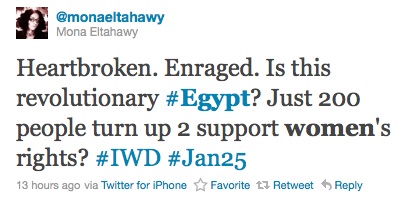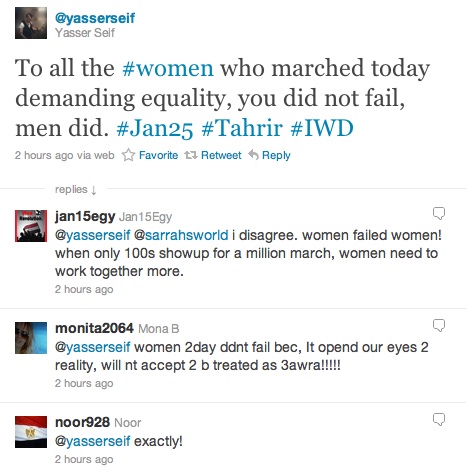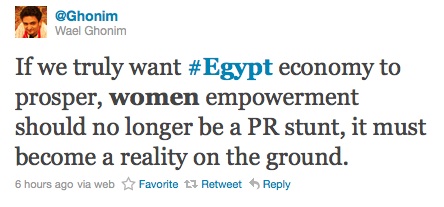2011-03-09 Cables: Why Million Women March in Egypt on International Women’s Day Was Disappointing

Stories of what happened as Egyptian women protested in Tahrir Square and called for equality and fairness in Egyptian society in honor of International Women’s Day are circulating. Female Egyptians hoped to have a million women march. Unfortunately, only a few hundred women came out to demonstrate and the action turned violent as men disrupted what should have been a peaceful day of celebration.
Christian Science Monitor reports men showed up and shouted, “Go wash clothes!” And said, “You are not married; go find a husband,” and “This is against Islam!” Men suggested women already have enough rights. They argued now was not the time to argue for rights.
Men decided women had been demonstrating for too long and violently scattered the women provoking the military to fire shots in the air. Sexual harassment, which many female Egyptians said during the uprising had disappeared, happened during the “melee.”
Cairo-based reporter and writer Ursula Lindsey reports one “48 year-old accountant” was "horrified by the protesters’ demand that women be allowed to run for the presidency.” He suggested Egyptians would “reject this completely” and added, “Women have a role, and men have a role. We’re used to men ruling. Who rules in my house? My father. And who rules in my family? I do.”
Lindsey notes, “There were more men than women present, and most of them expressed either indignation or amusement at the women’s demands.” Egyptian women who had struggled alongside men during the uprising that toppled President Hosni Mubarak were, for the first time, faced with the stark reality that culture and attitudes toward women remained largely unchanged.
Two tweets capture the frustration and rage women felt in the aftermath of the failed march:


There had already been some signs that patriarchy was still alive and well as the committee convened to amend the country’s constitution was all male. And, an amendment up for consideration prohibited a man with a foreign wife from running for president and left no room for the possibility of a woman running for president.
Giving women rights to participate in the political process has historically produced tension. 09CAIRO1148 provides an account of what happened when an amendment supported by the National Democratic Party (NDP) on women’s political participation was approved in 2009.
The Muslim Brotherhood and some independents find the measure to be “unconstitutional.” It is called a “farce,” as several critics thought the amendment was a wrong way to increase women’s participation because it seemed like a way for the NDP to increase the number of seats it had in the People’s Assembly (PA).
The amendment is linked to “Mubarak's pledge during the 2005 presidential elections to encourage women to play a more active role in politics.” It would establish a “quota for women’s participation in the PA for a period of 10 years.” President of the Democratic Front Party Dr. Osama El-Ghazali considers the amendment to be “long overdue” and notes, “Egypt led the region, with the first women MPs elected to parliament in 1957, but that sadly little had changed in over fifty years.”
08CAIRO2262 details Nehad Aboul Komsan, Embassy Cairo’s nominee in 2009 for the Secretary’s International Women of Courage award. Komsan’s efforts as Chair of the Board of Directors of the Egyptian Center for Women's Rights (ECWR) are lauded. It reads:
… courageously pressed for advancement on women's issues in the face of government policy that is often indifferent to women's concerns and sometimes obstructionist. A lawyer by training, she has used her skills to provide legal aid to impoverished women, and legal representation for the plaintiff in the October 21 landmark ruling against a perpetrator of sexual assault (ref B). She has used her political skills to provide training for female candidates who successfully ran in 2005 and 2008 elections that were marred by government interference. Aboul Komsan has deployed her public relations skills in ECWR's campaign to raise awareness of sexual harassment and assault, and to publicize the dangers of female genital mutilation (FGM) -- playing an important role in the passage of the June 2008 Child Law that criminalizes the practice.
According to the cable, she is the leader of the only organization in Egypt waging a public campaign against sexual harassment and assault.
Finally, a September 2009 cable, 09CAIRO1758, outlines the anti-trafficking efforts of the National Council for Childhood and Motherhood. The cable specifically focuses on “summer marriages,” a phenomenon that involves Arab tourists that are on vacation “marrying” minors, often impregnating them and then abandoning them after their trips are over. The cable highlights a study that finds “girls and families agreed to these marriages because dowries and bridal gifts help provide substantial income for their families living in poverty.”
… According to the study, in 80 percent of the cases, the girls "consented" to the marriage, primarily because of high dowries of between 5,000-50,000 Egyptian pounds (USD 900-9,000) and bridal gifts help provide substantial income for families living in poverty. The average family of five in the three villages has an annual income of 8,300 Egyptian pounds (USD 1,500). "Brokers," assisted by women in the village, facilitate 85 percent of these "temporary" marriages. Two-thirds of the villagers were aware of summer marriages by girls in the three villages, but only 10 percent approved of these marriages.
The study leads to a telephone hotline being instituted to provide assistance and consulting to girls. Plans are put together to help healthcare providers understand trafficking laws and how to identify trafficking victims. The problem, exacerbated by poverty, leads to the development of a microcredit program. And, additionally, education is developed to inform parents on “dangers of ‘getting paid’ in exchange for their child’s labor as either a domestic servant or street beggar.”
A cable sent out two months later reveals the government decided to move on and go after Egyptian men marrying under-age girls.
Altogether, these cables show that a little progress has been made and that there are people on the ground doing work that must be done to advance the cause of women's rights. But, Egypt, like many countries in the Middle East and North Africa, has much to do to so women can enjoy equality, fairness and respect in society.
Tensions between Coptic Christians and Muslims will probably have to be addressed, especially since there are members of those religious sects that have deep prejudice toward and strict views on women.
As now well-known Google executive and activist Wael Ghonim tweets:

Or, as Amnesty International writes:
The dramatic events of the past two months have seen millions taking to the streets throughout the Middle East and North Africa, calling for change.
Women stood beside men, demanding an end to political repression and calling for root and branch reform. Both women and men have suffered under these repressive governments. But women have also had to cope with discriminatory laws and deeply entrenched gender inequality.
So it’s no wonder that women took to the streets. That they cheered loudly when Mubarak fell. Or that they wanted to believe the promise of a new dawn in Egyptian politics. But it remains to be seen how much will really change for the women of Egypt.
Photo by JMirielleM